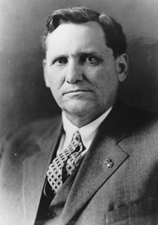Smith W. Brookhart
| Smith Wildman Brookhart | |
|---|---|
 |
|
|
United States Senator from Iowa |
|
|
In office November 8, 1922 – April 12, 1926 |
|
| Preceded by | Charles A. Rawson |
| Succeeded by | Daniel F. Steck |
|
In office March 4, 1927 – March 3, 1933 |
|
| Preceded by | David W. Stewart |
| Succeeded by | Richard L. Murphy |
| Personal details | |
| Born |
February 2, 1869 Arbela, Missouri |
| Died | November 15, 1944 (aged 75) Prescott, Arizona |
| Political party | Republican |
Smith Wildman Brookhart (February 2, 1869 – November 15, 1944), was twice elected as a Republican to represent Iowa in the United States Senate. He was considered an "insurgent" within the Republican Party; his criticisms of the Harding and Coolidge Administrations and of business interests alienated others within the Republican caucus, leading to his ouster from the Senate over an election challenge. Brookhart's absence from the Senate was brief, as he took the first opportunity to return by challenging and defeating the state's senior Republican senator. He was also a strong supporter of Prohibition and its enforcement, so as public support for prohibition waned, so too did his political career.
Brookhart was born in a cabin on a farm in Scotland County, Missouri, the son of Abram C. and Cynthia Wildman Brookhart. He was educated in country schools. Brookhart graduated from Bloomfield High School and then attended Southern Iowa Normal School, both in Bloomfield, Iowa, where he graduated in 1889, with an emphasis in scientific courses. For five years he taught in country schools and high school, meanwhile studying law in offices in Bloomfield and Keosauqua, Iowa. He was admitted to the bar in 1892 and began practice in Washington, Iowa. Four years later his brother, J. L. Brookhart, joined his firm. He served for six years as Washington County Attorney.
On June 22, 1897, he married Jennie Hearne. They had four sons and two daughters, Charles Edward Brookhart, John Roberts Brookhart, Samuel Colar Brookhart, Smith W. Brookhart Jr., Florence Hearne Brookhart Yount, and Edith A. Brookhart Millard.
...
Wikipedia
